Cloud Accounting Impact: Presentation for Business Plus Advisors
VerifiedAdded on 2023/06/09
|12
|1002
|463
Presentation
AI Summary
This presentation delves into cloud accounting, exploring its definition, benefits, and limitations in comparison to traditional accounting systems. It specifically addresses the implications for Business Plus Advisors and their clients, considering factors like cost, security, and adaptability. The presentation analyzes the advantages of cloud accounting, such as reduced administrative expenses and automation of financial statement preparation, while also acknowledging potential drawbacks like cybersecurity concerns and the need for accountant adaptability. The analysis includes a comparison between cloud and traditional accounting models, highlighting their suitability for different types of businesses. Based on this comprehensive assessment, the presentation offers recommendations on whether Business Plus Advisors should encourage their clients to transition to cloud accounting, providing a justified rationale for the suggested approach. Finally, the document references several academic sources to support the information provided.
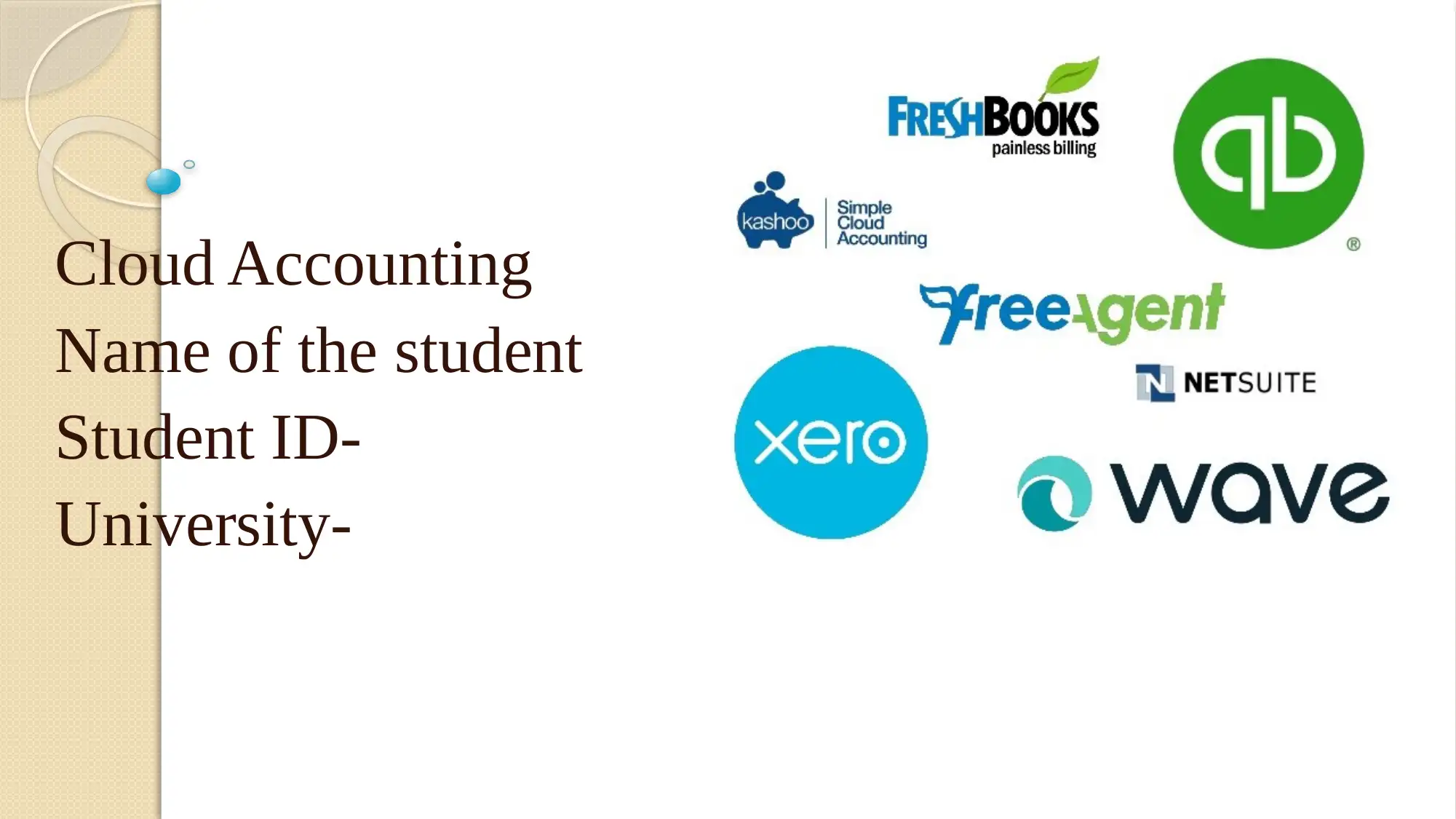
Cloud Accounting
Name of the student
Student ID-
University-
Name of the student
Student ID-
University-
Paraphrase This Document
Need a fresh take? Get an instant paraphrase of this document with our AI Paraphraser
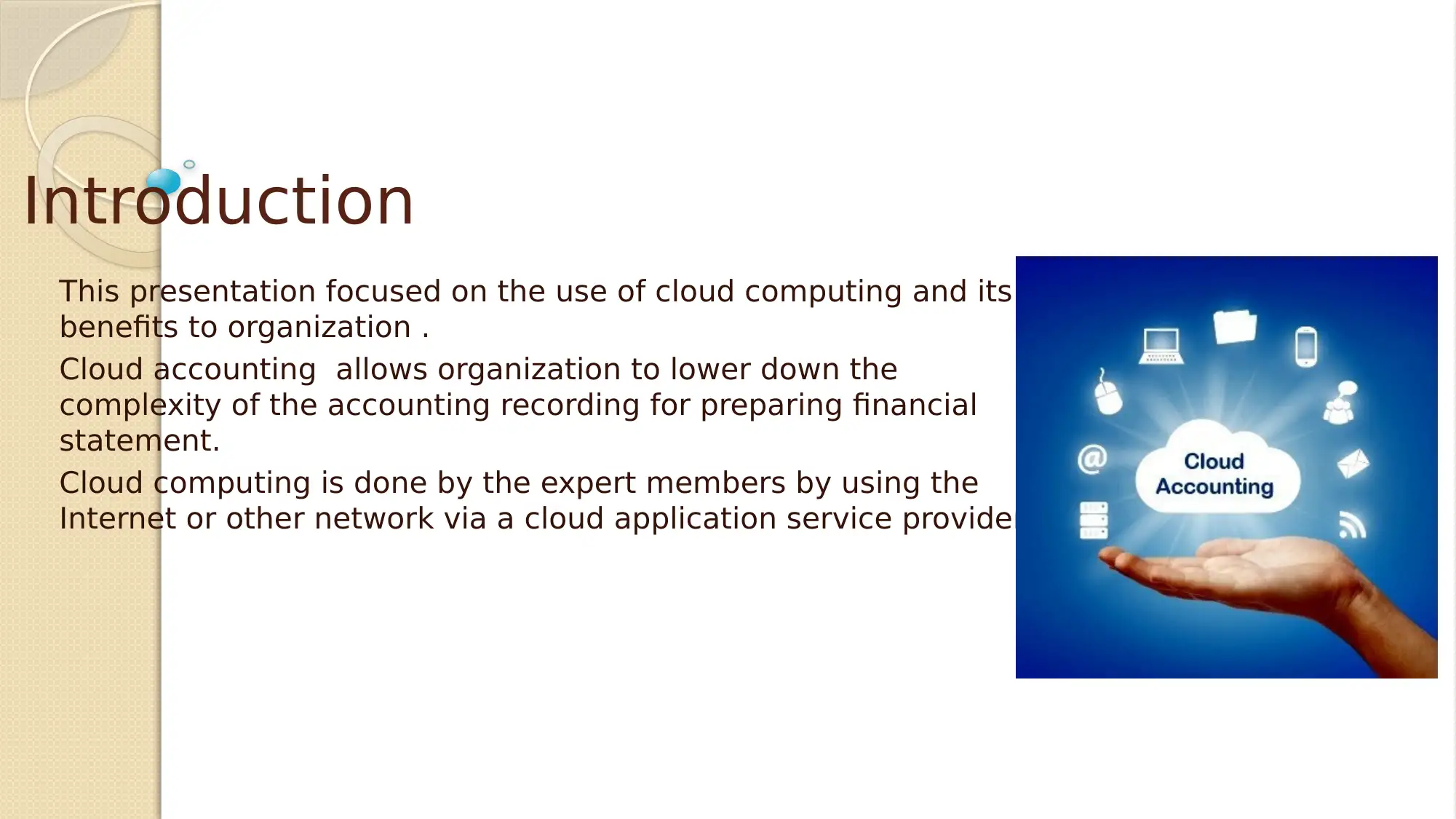
Introduction
This presentation focused on the use of cloud computing and its
benefits to organization .
Cloud accounting allows organization to lower down the
complexity of the accounting recording for preparing financial
statement.
Cloud computing is done by the expert members by using the
Internet or other network via a cloud application service provider
This presentation focused on the use of cloud computing and its
benefits to organization .
Cloud accounting allows organization to lower down the
complexity of the accounting recording for preparing financial
statement.
Cloud computing is done by the expert members by using the
Internet or other network via a cloud application service provider
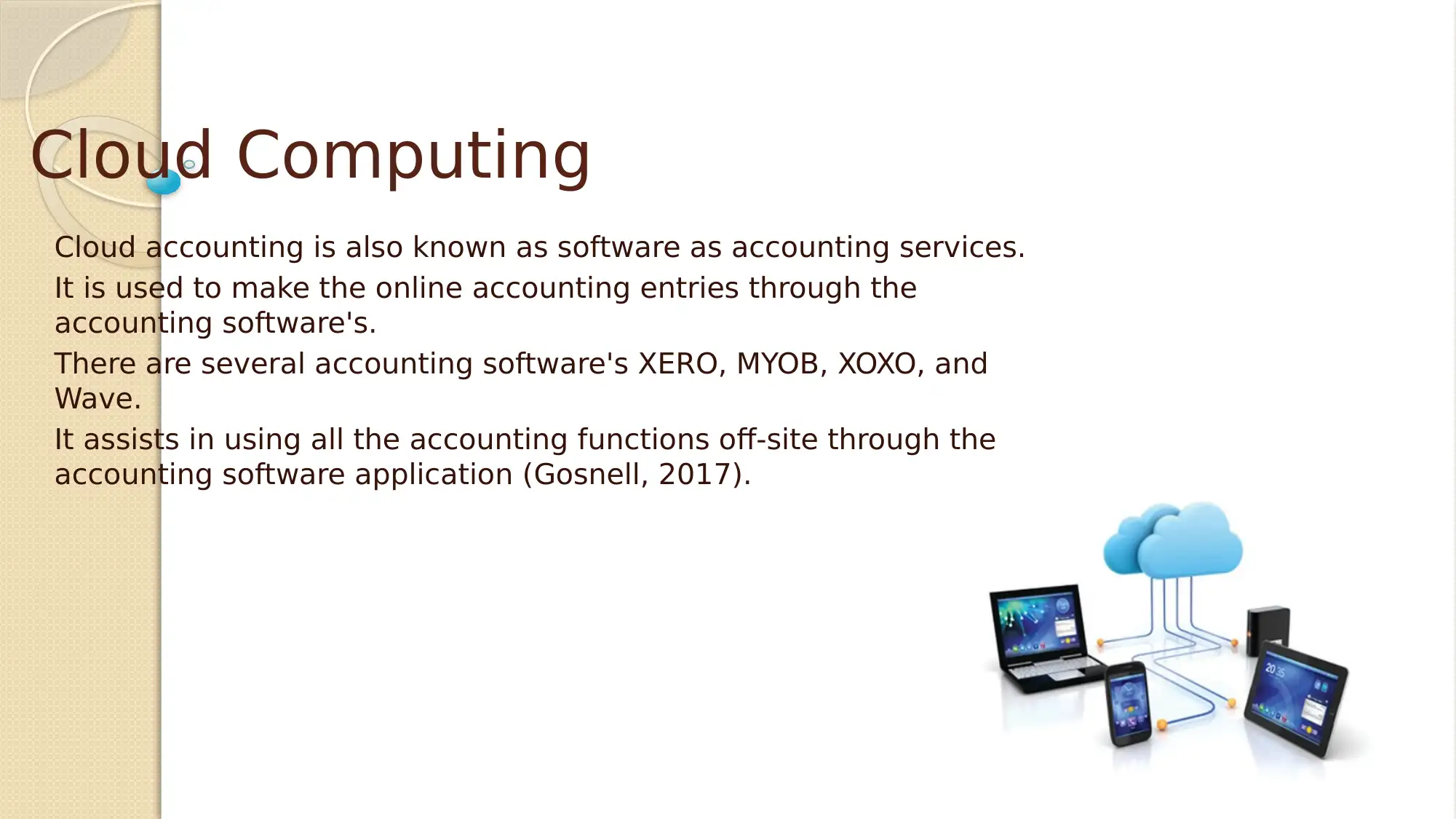
Cloud Computing
Cloud accounting is also known as software as accounting services.
It is used to make the online accounting entries through the
accounting software's.
There are several accounting software's XERO, MYOB, XOXO, and
Wave.
It assists in using all the accounting functions off-site through the
accounting software application (Gosnell, 2017).
Cloud accounting is also known as software as accounting services.
It is used to make the online accounting entries through the
accounting software's.
There are several accounting software's XERO, MYOB, XOXO, and
Wave.
It assists in using all the accounting functions off-site through the
accounting software application (Gosnell, 2017).
⊘ This is a preview!⊘
Do you want full access?
Subscribe today to unlock all pages.

Trusted by 1+ million students worldwide
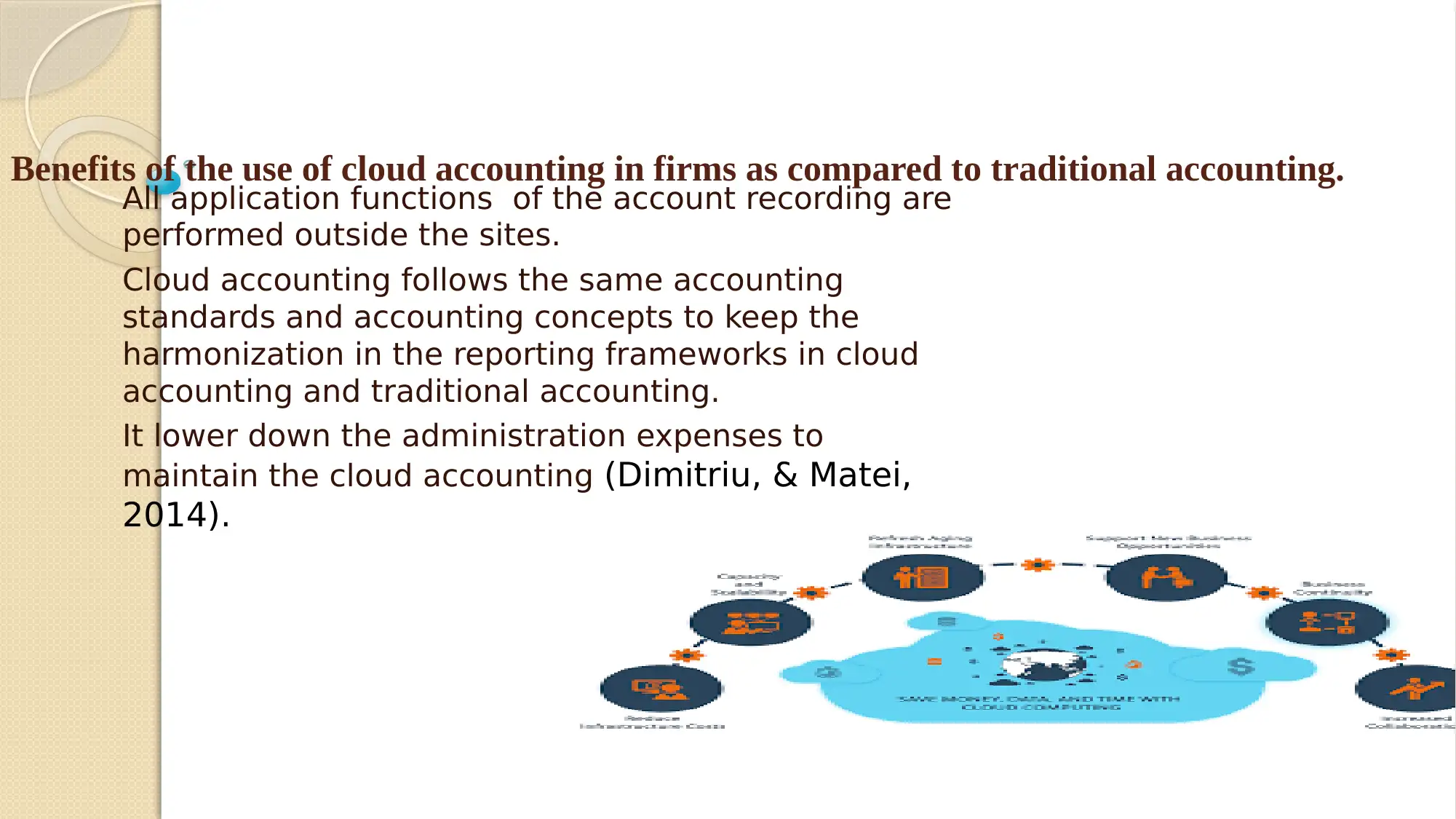
Benefits of the use of cloud accounting in firms as compared to traditional accounting.
All application functions of the account recording are
performed outside the sites.
Cloud accounting follows the same accounting
standards and accounting concepts to keep the
harmonization in the reporting frameworks in cloud
accounting and traditional accounting.
It lower down the administration expenses to
maintain the cloud accounting (Dimitriu, & Matei,
2014).
All application functions of the account recording are
performed outside the sites.
Cloud accounting follows the same accounting
standards and accounting concepts to keep the
harmonization in the reporting frameworks in cloud
accounting and traditional accounting.
It lower down the administration expenses to
maintain the cloud accounting (Dimitriu, & Matei,
2014).
Paraphrase This Document
Need a fresh take? Get an instant paraphrase of this document with our AI Paraphraser
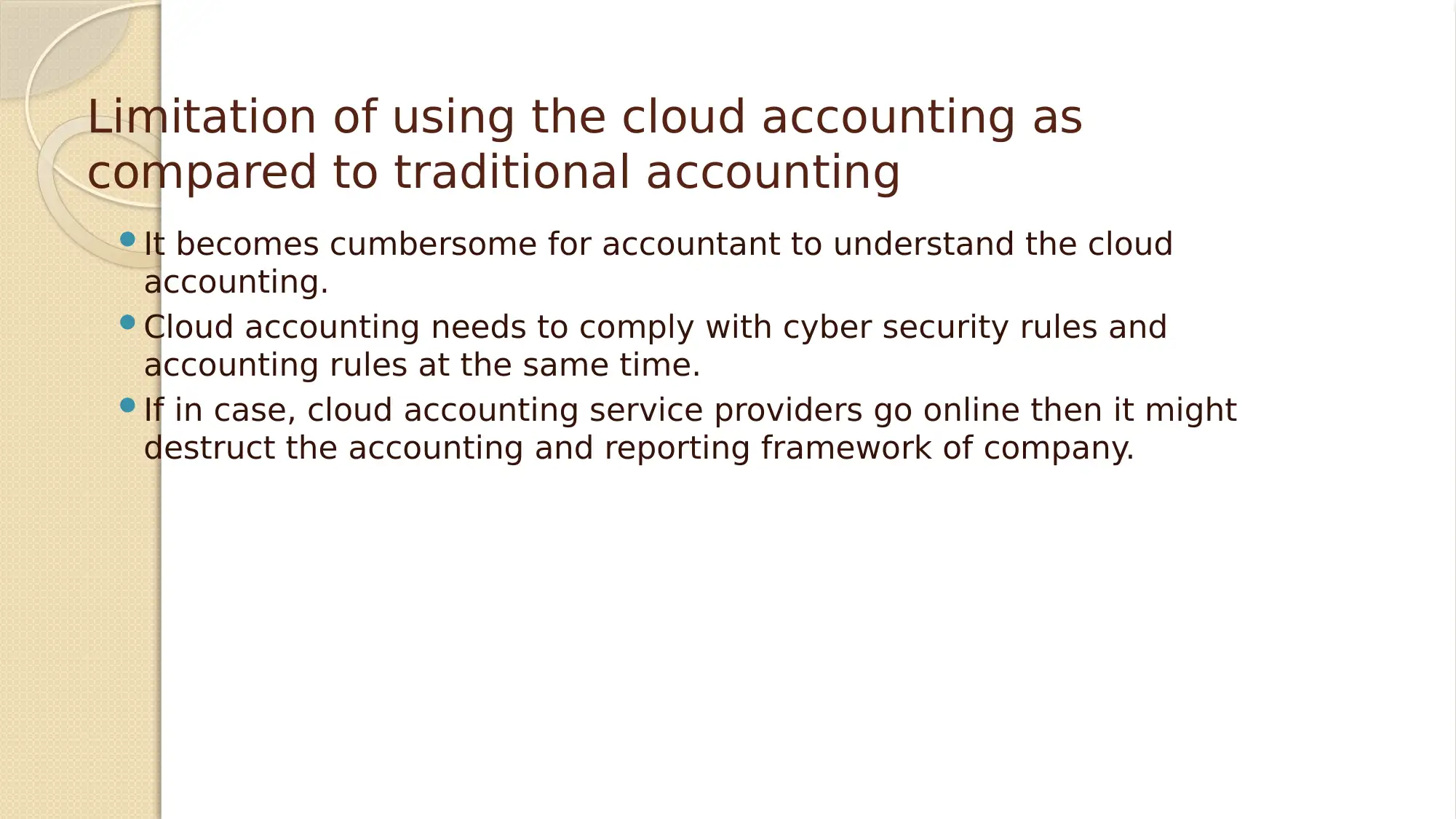
Limitation of using the cloud accounting as
compared to traditional accounting
It becomes cumbersome for accountant to understand the cloud
accounting.
Cloud accounting needs to comply with cyber security rules and
accounting rules at the same time.
If in case, cloud accounting service providers go online then it might
destruct the accounting and reporting framework of company.
compared to traditional accounting
It becomes cumbersome for accountant to understand the cloud
accounting.
Cloud accounting needs to comply with cyber security rules and
accounting rules at the same time.
If in case, cloud accounting service providers go online then it might
destruct the accounting and reporting framework of company.
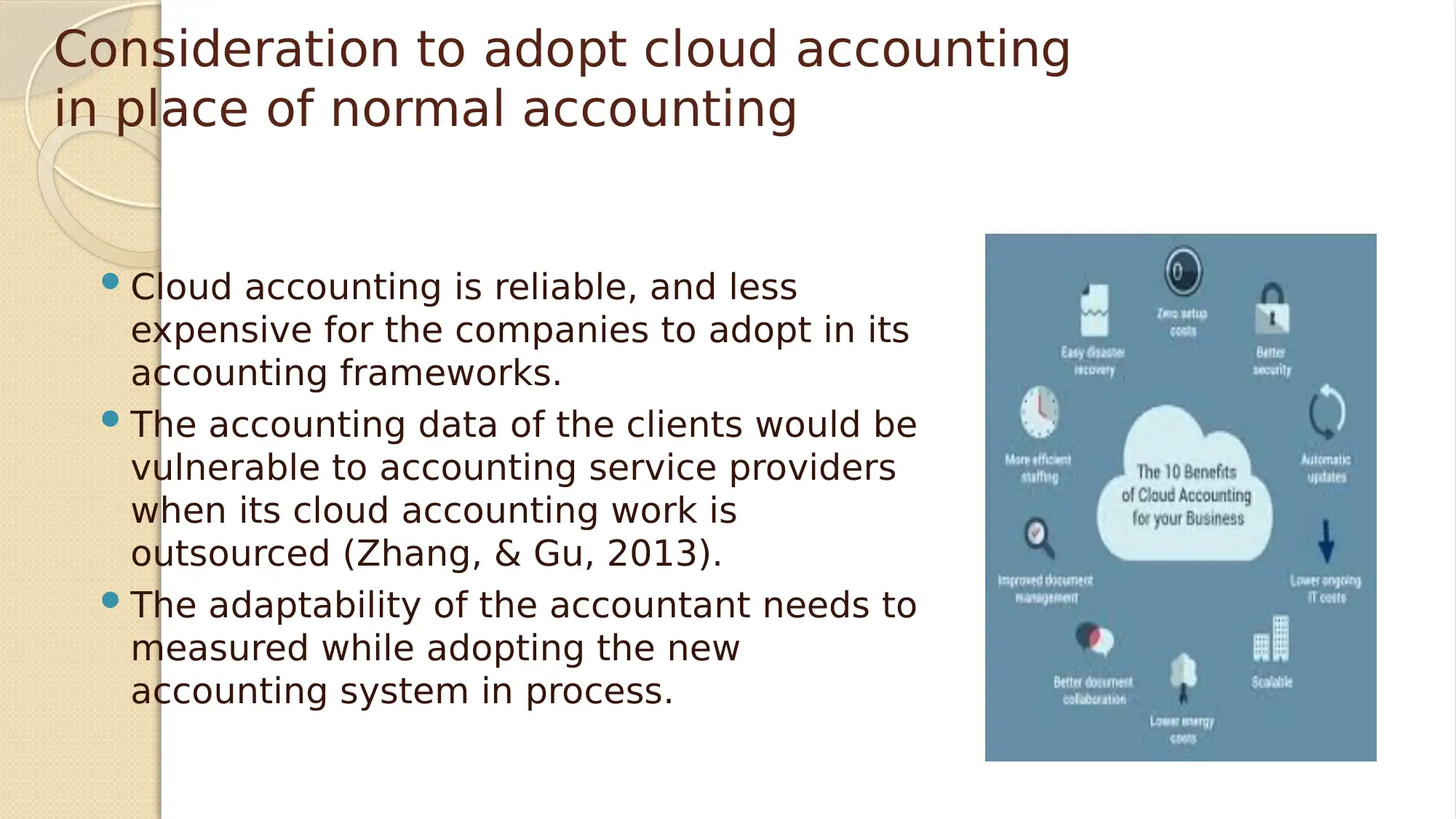
Consideration to adopt cloud accounting
in place of normal accounting
Cloud accounting is reliable, and less
expensive for the companies to adopt in its
accounting frameworks.
The accounting data of the clients would be
vulnerable to accounting service providers
when its cloud accounting work is
outsourced (Zhang, & Gu, 2013).
The adaptability of the accountant needs to
measured while adopting the new
accounting system in process.
in place of normal accounting
Cloud accounting is reliable, and less
expensive for the companies to adopt in its
accounting frameworks.
The accounting data of the clients would be
vulnerable to accounting service providers
when its cloud accounting work is
outsourced (Zhang, & Gu, 2013).
The adaptability of the accountant needs to
measured while adopting the new
accounting system in process.
⊘ This is a preview!⊘
Do you want full access?
Subscribe today to unlock all pages.

Trusted by 1+ million students worldwide
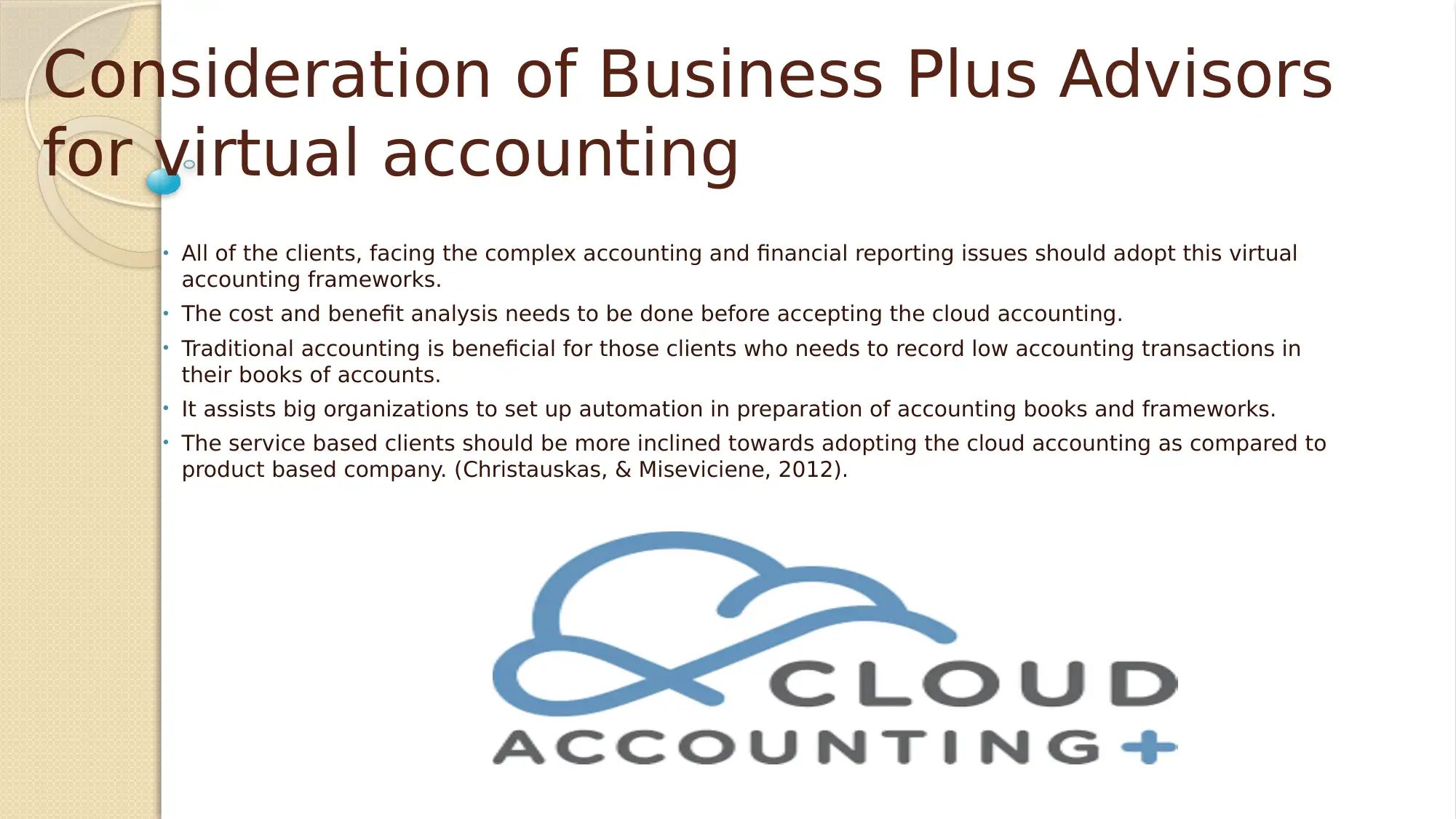
Consideration of Business Plus Advisors
for virtual accounting
• All of the clients, facing the complex accounting and financial reporting issues should adopt this virtual
accounting frameworks.
• The cost and benefit analysis needs to be done before accepting the cloud accounting.
• Traditional accounting is beneficial for those clients who needs to record low accounting transactions in
their books of accounts.
• It assists big organizations to set up automation in preparation of accounting books and frameworks.
• The service based clients should be more inclined towards adopting the cloud accounting as compared to
product based company. (Christauskas, & Miseviciene, 2012).
for virtual accounting
• All of the clients, facing the complex accounting and financial reporting issues should adopt this virtual
accounting frameworks.
• The cost and benefit analysis needs to be done before accepting the cloud accounting.
• Traditional accounting is beneficial for those clients who needs to record low accounting transactions in
their books of accounts.
• It assists big organizations to set up automation in preparation of accounting books and frameworks.
• The service based clients should be more inclined towards adopting the cloud accounting as compared to
product based company. (Christauskas, & Miseviciene, 2012).
Paraphrase This Document
Need a fresh take? Get an instant paraphrase of this document with our AI Paraphraser
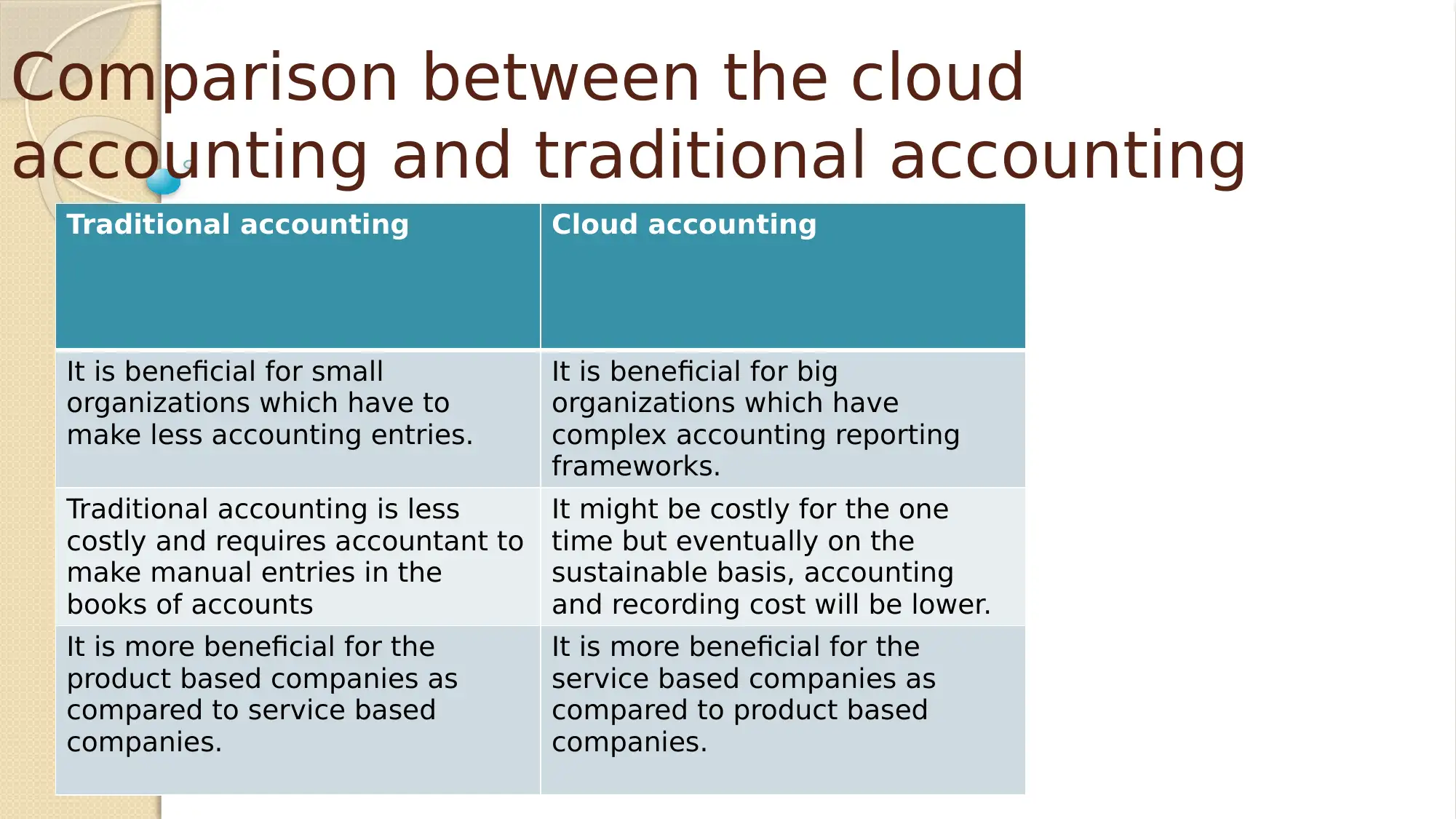
Comparison between the cloud
accounting and traditional accounting
Traditional accounting Cloud accounting
It is beneficial for small
organizations which have to
make less accounting entries.
It is beneficial for big
organizations which have
complex accounting reporting
frameworks.
Traditional accounting is less
costly and requires accountant to
make manual entries in the
books of accounts
It might be costly for the one
time but eventually on the
sustainable basis, accounting
and recording cost will be lower.
It is more beneficial for the
product based companies as
compared to service based
companies.
It is more beneficial for the
service based companies as
compared to product based
companies.
accounting and traditional accounting
Traditional accounting Cloud accounting
It is beneficial for small
organizations which have to
make less accounting entries.
It is beneficial for big
organizations which have
complex accounting reporting
frameworks.
Traditional accounting is less
costly and requires accountant to
make manual entries in the
books of accounts
It might be costly for the one
time but eventually on the
sustainable basis, accounting
and recording cost will be lower.
It is more beneficial for the
product based companies as
compared to service based
companies.
It is more beneficial for the
service based companies as
compared to product based
companies.
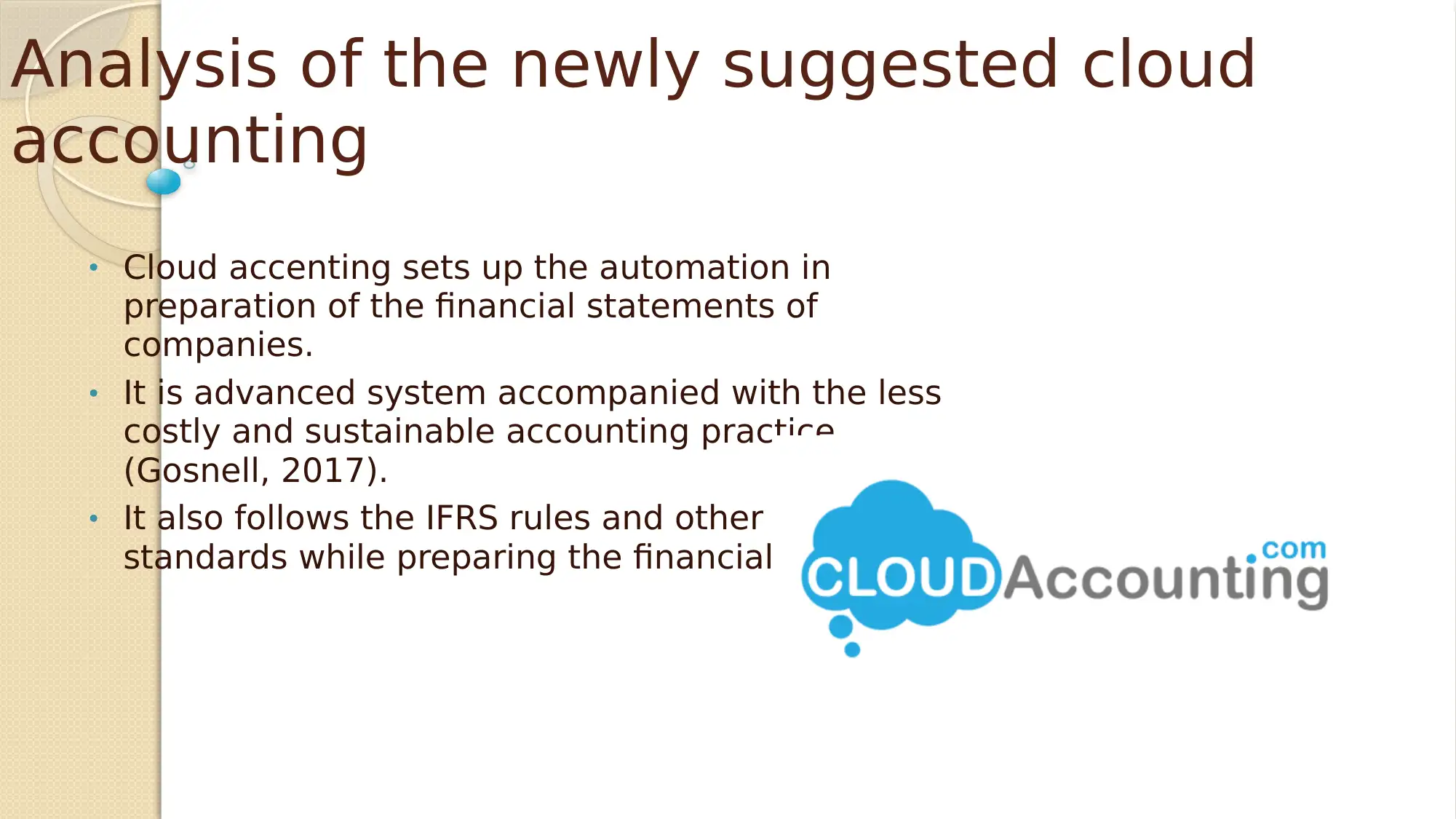
Analysis of the newly suggested cloud
accounting
• Cloud accenting sets up the automation in
preparation of the financial statements of
companies.
• It is advanced system accompanied with the less
costly and sustainable accounting practice
(Gosnell, 2017).
• It also follows the IFRS rules and other accounting
standards while preparing the financial statements.
accounting
• Cloud accenting sets up the automation in
preparation of the financial statements of
companies.
• It is advanced system accompanied with the less
costly and sustainable accounting practice
(Gosnell, 2017).
• It also follows the IFRS rules and other accounting
standards while preparing the financial statements.
⊘ This is a preview!⊘
Do you want full access?
Subscribe today to unlock all pages.

Trusted by 1+ million students worldwide
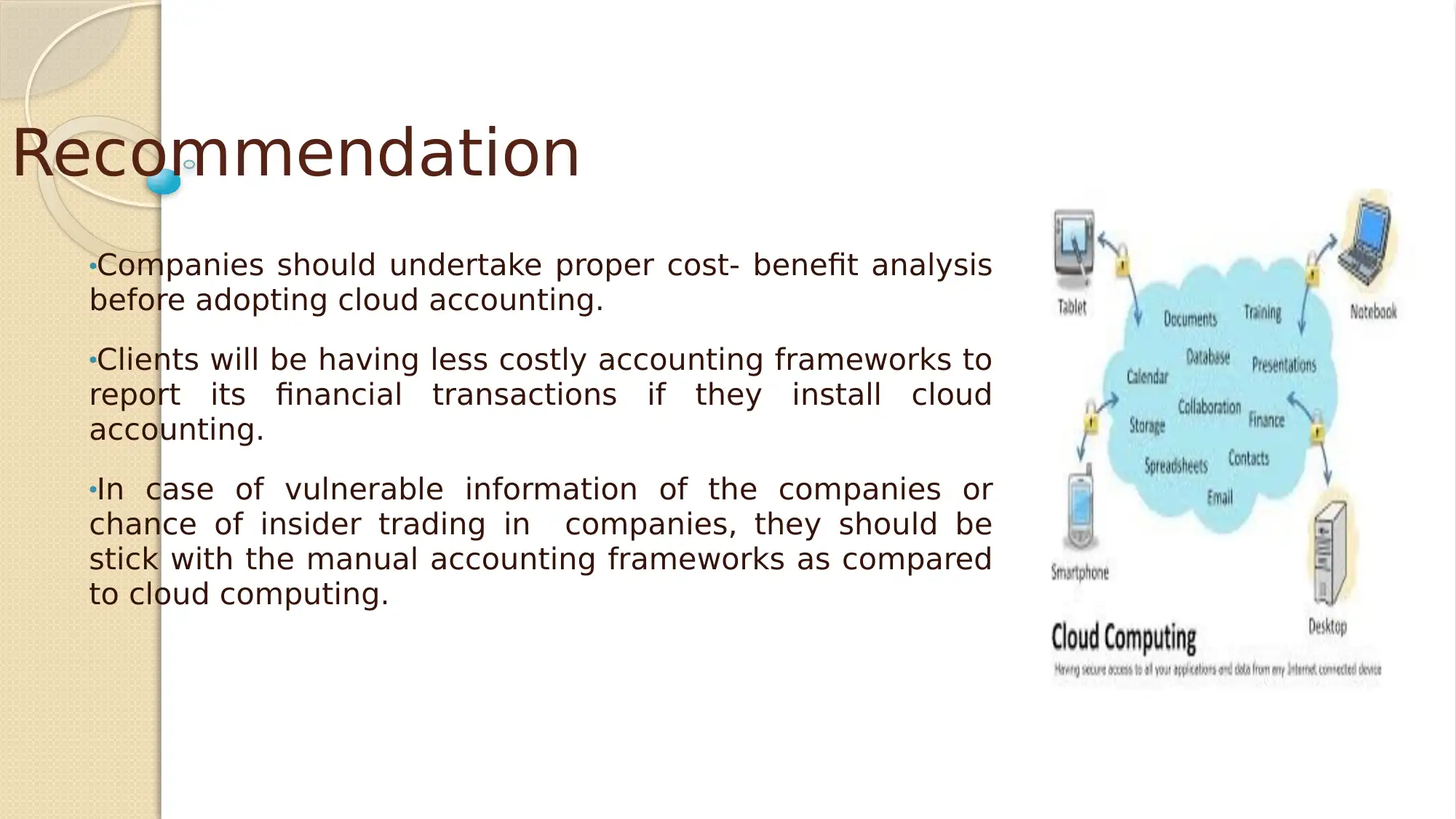
Recommendation
•Companies should undertake proper cost- benefit analysis
before adopting cloud accounting.
•Clients will be having less costly accounting frameworks to
report its financial transactions if they install cloud
accounting.
•In case of vulnerable information of the companies or
chance of insider trading in companies, they should be
stick with the manual accounting frameworks as compared
to cloud computing.
•Companies should undertake proper cost- benefit analysis
before adopting cloud accounting.
•Clients will be having less costly accounting frameworks to
report its financial transactions if they install cloud
accounting.
•In case of vulnerable information of the companies or
chance of insider trading in companies, they should be
stick with the manual accounting frameworks as compared
to cloud computing.
Paraphrase This Document
Need a fresh take? Get an instant paraphrase of this document with our AI Paraphraser
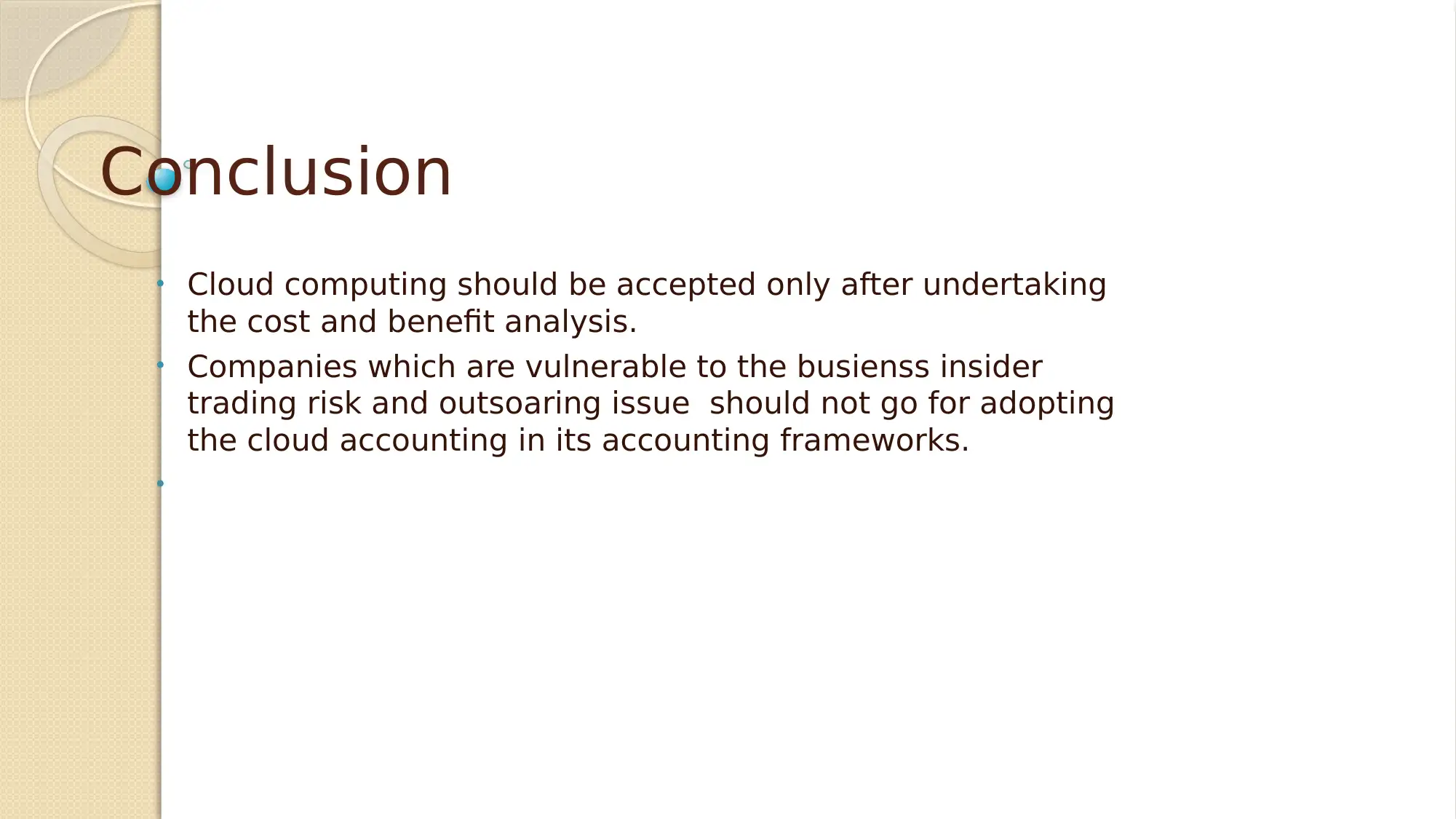
Conclusion
• Cloud computing should be accepted only after undertaking
the cost and benefit analysis.
• Companies which are vulnerable to the busienss insider
trading risk and outsoaring issue should not go for adopting
the cloud accounting in its accounting frameworks.
•
• Cloud computing should be accepted only after undertaking
the cost and benefit analysis.
• Companies which are vulnerable to the busienss insider
trading risk and outsoaring issue should not go for adopting
the cloud accounting in its accounting frameworks.
•
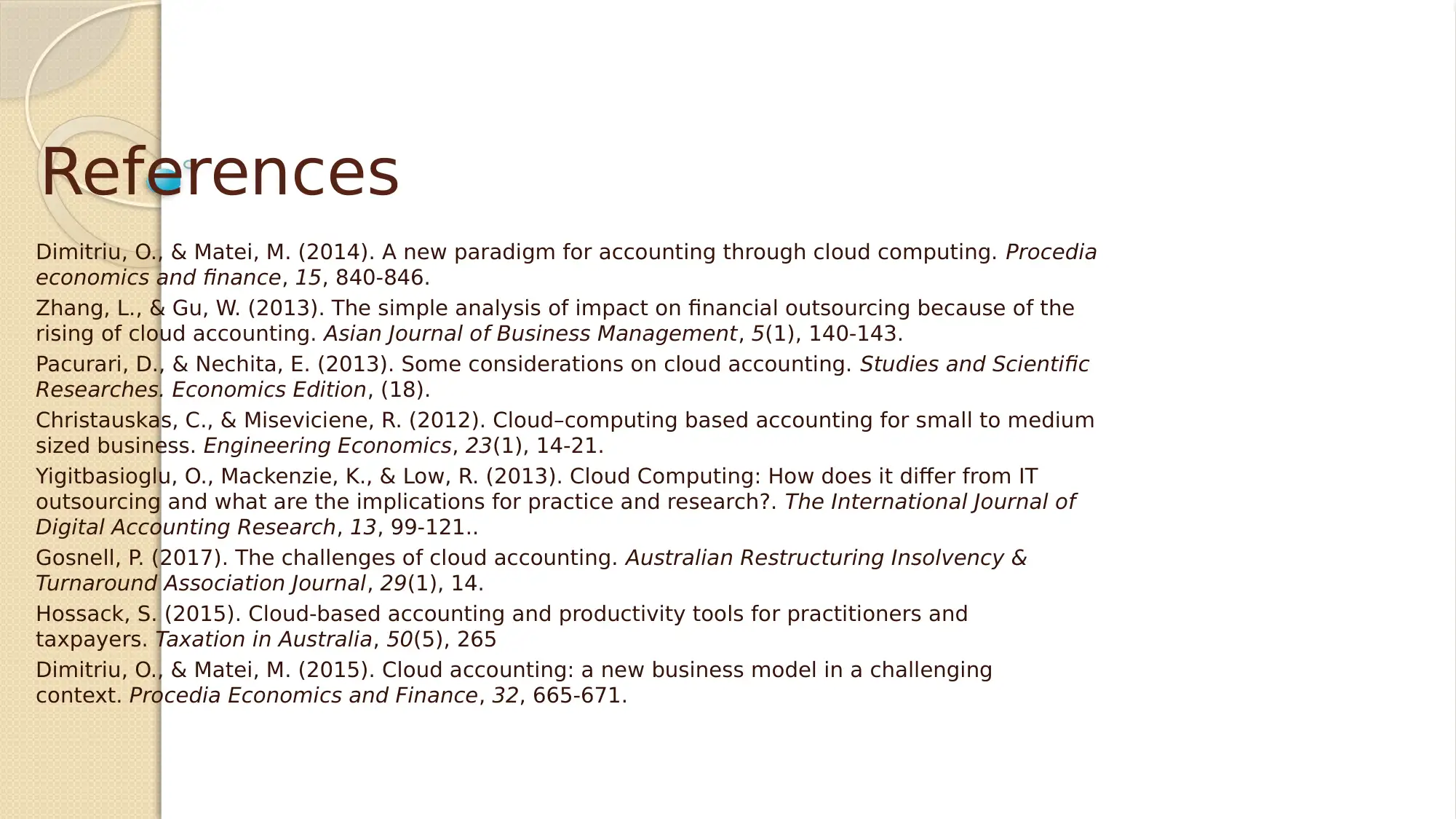
References
Dimitriu, O., & Matei, M. (2014). A new paradigm for accounting through cloud computing. Procedia
economics and finance, 15, 840-846.
Zhang, L., & Gu, W. (2013). The simple analysis of impact on financial outsourcing because of the
rising of cloud accounting. Asian Journal of Business Management, 5(1), 140-143.
Pacurari, D., & Nechita, E. (2013). Some considerations on cloud accounting. Studies and Scientific
Researches. Economics Edition, (18).
Christauskas, C., & Miseviciene, R. (2012). Cloud–computing based accounting for small to medium
sized business. Engineering Economics, 23(1), 14-21.
Yigitbasioglu, O., Mackenzie, K., & Low, R. (2013). Cloud Computing: How does it differ from IT
outsourcing and what are the implications for practice and research?. The International Journal of
Digital Accounting Research, 13, 99-121..
Gosnell, P. (2017). The challenges of cloud accounting. Australian Restructuring Insolvency &
Turnaround Association Journal, 29(1), 14.
Hossack, S. (2015). Cloud-based accounting and productivity tools for practitioners and
taxpayers. Taxation in Australia, 50(5), 265
Dimitriu, O., & Matei, M. (2015). Cloud accounting: a new business model in a challenging
context. Procedia Economics and Finance, 32, 665-671.
Dimitriu, O., & Matei, M. (2014). A new paradigm for accounting through cloud computing. Procedia
economics and finance, 15, 840-846.
Zhang, L., & Gu, W. (2013). The simple analysis of impact on financial outsourcing because of the
rising of cloud accounting. Asian Journal of Business Management, 5(1), 140-143.
Pacurari, D., & Nechita, E. (2013). Some considerations on cloud accounting. Studies and Scientific
Researches. Economics Edition, (18).
Christauskas, C., & Miseviciene, R. (2012). Cloud–computing based accounting for small to medium
sized business. Engineering Economics, 23(1), 14-21.
Yigitbasioglu, O., Mackenzie, K., & Low, R. (2013). Cloud Computing: How does it differ from IT
outsourcing and what are the implications for practice and research?. The International Journal of
Digital Accounting Research, 13, 99-121..
Gosnell, P. (2017). The challenges of cloud accounting. Australian Restructuring Insolvency &
Turnaround Association Journal, 29(1), 14.
Hossack, S. (2015). Cloud-based accounting and productivity tools for practitioners and
taxpayers. Taxation in Australia, 50(5), 265
Dimitriu, O., & Matei, M. (2015). Cloud accounting: a new business model in a challenging
context. Procedia Economics and Finance, 32, 665-671.
⊘ This is a preview!⊘
Do you want full access?
Subscribe today to unlock all pages.

Trusted by 1+ million students worldwide
1 out of 12
Related Documents
Your All-in-One AI-Powered Toolkit for Academic Success.
+13062052269
info@desklib.com
Available 24*7 on WhatsApp / Email
![[object Object]](/_next/static/media/star-bottom.7253800d.svg)
Unlock your academic potential
Copyright © 2020–2026 A2Z Services. All Rights Reserved. Developed and managed by ZUCOL.




